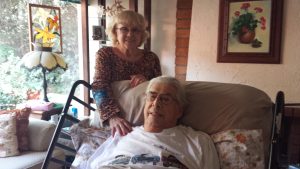 BY RAUL HERNANDEZ
BY RAUL HERNANDEZ
Notebookventura@gmail.com
If it weren’t for my 89-year-old buddy, Mickey Schlein, Dog the Bounty Hunter would have never made it on the airwaves. The Dog, Duane Chapman, might have been living under a freeway bridge or serving divorce papers for lawyers.
Chapman made international news when he went to Mexico and nabbed Luster, an heir to the Max Factor cosmetics empire. Luster was charged in Ventura County, California with 86 counts including multiple rape charges related to sexual assaults that happened in 1996, 1997 and 2000.
Before I continue the story about Luster’s phone call to Mickey, I must first say that on Thursday I went to see my friend at his home in Ventura. I heard he was frail in health, bedridden and under Hospice care.
It had been three years since I left the Ventura County Star newspaper. I live in Santa Barbara, 30 miles away. So, I had not seen Mickey.
When I saw him lying on the bed in the middle of the living room, his smile was just as sweet and his voice just as calm. His memory is still fine-tuned. A keen memory that can recall details, dates, names and even some of the court hearings of long ago.
Mickey, a retired house painter, turned court watcher at the Ventura County Superior Courts for 16 years, was also a copious notetaker, knew almost everybody at the Ventura County courthouse, and a great story teller, especially about the courts’ cast and crew.
The Andrew Luster Story
My favorite Mickey story was about the Andrew Luster phone call. Mickey is still baffled on how Luster got his phone number.

In the middle of his trial, Luster called Mickey who was taking notes while testimony and evidence was being presented. By this time, jurors had seen the video tapes of Luster raping his drugged victims, and the images were pretty graphic, according to Mickey.
Mickey was surprised by Luster’s call although friendly, he asked Mickey what he thought about the trial and whether he would be convicted.
“Are you serious? You got to be kidding me. You really want to know the truth? Your not that stupid,” Mickey said he told Luster.
Mickey told Norma ,who had picked up the phone when Luster, called: “You know who that is? The bad, bad guy.”
After Luster talked to Mickey, he fled to Mexico in January 2003 while under a $1 million bond.
Luster was tried in absentia and sentenced to 125 years. The sentenced was later reduced to 50 years. In April 2003, Duane “Dog” Chapman captured him. Dog became famous and got his own TV series.
Mickey’s Holding Court
Although Mickey and his notebook have been permanently sidelined, he is holding court in his living room. The Who’s Who of the Ventura County Courthouse have dropped by or sent cards or letters.
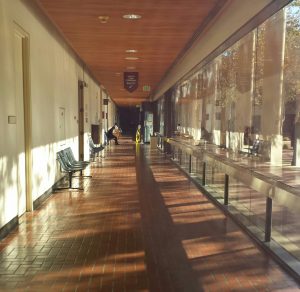 Former Ventura County Superior Court Judge James Cloninger, who now lives in Nevada came by and stayed a while. District Attorney Greg Totten sent a note and an award that states: “Thank you for being a bright light at the HOJ (Hall of Justice),” and the Sheriff of Ventura County Geoff Dean and three of his deputies, including Capt.Randy Watkins who supervises courthouse security, showed up to say hi, cheer him up and wish him well.
Former Ventura County Superior Court Judge James Cloninger, who now lives in Nevada came by and stayed a while. District Attorney Greg Totten sent a note and an award that states: “Thank you for being a bright light at the HOJ (Hall of Justice),” and the Sheriff of Ventura County Geoff Dean and three of his deputies, including Capt.Randy Watkins who supervises courthouse security, showed up to say hi, cheer him up and wish him well.
Also lawyers, court clerks and other friends sent notes, cards or went to see Mickey.
There are get-well cards sitting across the top of the piano near his bed that stand like paper trophies, attesting to many courthouse friends who miss his ambling gait and trademark white tennis shoes that made their way from one courtroom to the other.
Norma said the letter she received from Judge Brian Back made her want to weep, noting the sentence from Judge Back that touched her heart, referring to Mickey’s courthouse absence: “I never know what’s happening anymore.”
Imperfect Places
Mickey and I share this love of the criminal justice system and courthouses.
In my mind, it’s like this.
 Courthouses are imperfect places with flawed people who mete out justice, and many times, unfortunately, they fail.
Courthouses are imperfect places with flawed people who mete out justice, and many times, unfortunately, they fail.
But they are places where you can get front-row seats to emotional ballets and dramas that are often filled with passion, where rage can show its fangs, joy sometimes abounds, and laughter, most of it spontaneous, tries to shake off the sadness like the cold sobriety of autopsy images projected on white walls for jurors or the painful testimony of broken victims.
These are places where juries also award people millions of dollars in damages; children are adopted; disputes between neighbors are settled and marriages are dissolved.
It is a place that will change people who go through its doors and stay there too long.
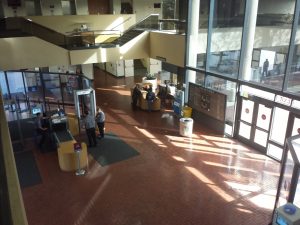 A Michigan judge said it best.
A Michigan judge said it best.
“You’ll never walk out the same,” she said.
Through the years, Mickey filled hundreds of notebooks, and clipped and collected a lot of newspaper articles. I was flattered that some had my byline. He told people that one day, he wanted to sit down and write a book with all the newspaper articles and notebooks he had collected about all the courthouse cases, defendants, victims, lawyers and others
Thursday, Mickey said. “I never really got around to it. I kept putting it off.”
Meeting Mickey
Mickey was Ventura Superior Courts unofficial air-traffic controller of sorts.
In the mornings when he arrived, he’d sometimes go stand next to the information booth on the first-floor of the courthouse where people who flood into the place often stop by.
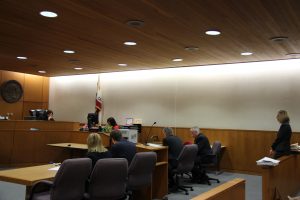 Most who go through the doors look like they just landed on the moon. So Mickey would help them out, point them in the right direction or occasionally, tell the high school or college students who were writing court assignments where the best trials or hearings were going on.
Most who go through the doors look like they just landed on the moon. So Mickey would help them out, point them in the right direction or occasionally, tell the high school or college students who were writing court assignments where the best trials or hearings were going on.
Or, he’d just smile, nod or wave and wish those entering a good morning and greet some court workers or lawyers by name. He knew almost everyone in the building, even some of the janitors.
What was most incredible was his ability to repeat almost by memory who said what during a court hearing, what the judge ruled in a case, and the names of the lawyers involved in a case.
I had to size up Mickey those first months of my eight years covering the Ventura courts. Initially, he insisted I cover this case or that one or made sure I didn’t miss that court hearing or this trial.
I remember one day, when he had not yet figured me out, my sense of humor kicked into gear.
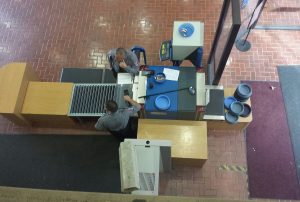 Mickey said I should cover an attempted murder trial. I asked him for details. Basically, he said a younger man tried to kill an older man but the older man took the weapon away and beat up his young assailant.
Mickey said I should cover an attempted murder trial. I asked him for details. Basically, he said a younger man tried to kill an older man but the older man took the weapon away and beat up his young assailant.
I asked a few questions, nodded and said with a straight face: “I don’t cover attempted murders, Mick.”
“What? Why?”
“This is America, you don’t give ink to attempts,” I said with a somber tone. “Ever heard of the Olympics? They don’t give gold medals to people who attempt to do something. We don’t reward mediocrity. That’s why this country is so great.”
He said other reporters covered attempts.
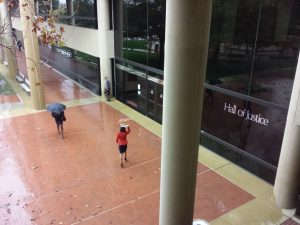 “Well, I’m not other reporters. Look get back to me if there are more victims in these attempts, and I will reconsider because it would be like bonus points, okay?”
“Well, I’m not other reporters. Look get back to me if there are more victims in these attempts, and I will reconsider because it would be like bonus points, okay?”
Frustrated, he left shaking his head, “Oh, brother.”
Later, he found out that I was kidding. We soon became courthouse friends and even had lunch together a few times.
First time we went to lunch, I thought I better give this 80 something man time to maneuver the lunch-time traffic. So I tacked on 15 minutes for lunch because we were going to his favorite Chinese place a few miles from the courthouse.
I thought the drive there would take longer than the lunch.
I was wrong.
 Before starting the engine, Mickey popped the lone CD inside his car. A Rod Stewart CD titled “The Great American Songbook,” some real mellow tunes. When he’d put his foot on the peddle, I’d hang on. It was a white-knuckle ride. I thought this was just his way to get payback for the “I-don’t-do-attempted-murder-stories” humor.
Before starting the engine, Mickey popped the lone CD inside his car. A Rod Stewart CD titled “The Great American Songbook,” some real mellow tunes. When he’d put his foot on the peddle, I’d hang on. It was a white-knuckle ride. I thought this was just his way to get payback for the “I-don’t-do-attempted-murder-stories” humor.
But on the third trip to lunch, he popped in the same Rod Stewart CD, and we were off, passing cars left and right, going 10 or 15 miles over the speed limit.
“You like Rod Stewart, do you?” I asked with a tinge of sarcasm.
“Oh, yes,” he said.
‘That’s obvious. I am going to get you a CD by the Stones.”
During lunch, Mickey’s humor would crack me up. He once told me the story about a lethargic, slow moving and well-known criminal lawyer named Joe who left his briefcase in his car parked at an adjacent lot. The frustrated judge asked how much time he needed to go and get the briefcase, an hour? Everybody laughed, Mickey said.
I told Mickey I wanted to be like him. When I got to be 80 years old, I am going to find front-row seats in courtrooms somewhere. He encouraged me to do it, saying he loved every minute he spent there.
Mickey’s Bride
Mickey’s bride of 48 years, Norma, is a lovely lady and was a gracious host when Mickey invited his courthouse friend Wayne, whose last name I can’t recall, and I, to have dinner at his house.
Mickey and Norma proudly talked about their lives, three adult daughters — Marsha, Becky and Kerry and grandchildren.
 Thursday, she was tenderly attending to her husband’s every need, calling him, “papa” and “baby” and other words newlyweds say to each other on their honeymoon.
Thursday, she was tenderly attending to her husband’s every need, calling him, “papa” and “baby” and other words newlyweds say to each other on their honeymoon.
She is the apple of Mickey’s eye. But her face sometimes filled up with the hurt coming from her heart.
Mickey’s younger sister, Susan “Susi” Masi, was there also. Susi boasted about her older brother who was generous with his time.
“He was a good dancer,” she said.
The talk centered on family, friends, times past and of course, the courthouse.
Mickey, a World War II Navy veteran, painted houses for three decades before he retired. He was so good with a brush that Mickey’s waiting list was six months. He painted the houses of actor Charles Boyer; actor/singer Mario Lanza; actress Sandy Duncan; and of course, Smokey Robinson, singer with the R&B group the Miracles.
Norma said Mickey who is Jewish painted her Lutheran church. Mickey got a check for the job but donated the money back to Norma’s church.
“Huh, papa?” she said looking at Mickey. “That was so sweet.”
Saying Later to a Friend
When I arrived at the Schlein house, Norma read my get-well card to Mickey. I wrote: “To the best court watcher in the entire planet. I was blessed that the Lord brought you on the path of my life. You are an inspiration and sweet man.”
As I said goodbye to Mickey and was walking out the door, he clutched his fingers together and said with a smile: “Raul, I am glad you crossed the path of my life.”
I smiled back but got a bit choked up: “I am glad too, Mickey.”
Every time, I hear Rod Stewart singing, “Fly Me to the Moon” or see the cover of a Great American Songbook CD, I will think about Mickey and Norma, and smile.
“Fill my heart with song
And let me sing for ever more
You are all I long for
All I worship and adore
In other words, please be true
In other words, I love you.” — Rod Stewart


Raul, I didn’t meet you when you were here. I’m Becky, Norma and Mickey’s daughter. Mom and I just finished reading the article. It was hard to do as I was crying much of the time. Thank you so much for honoring Papa in this way. Your kind words mean more than you know. Pops was blessed to have a friend as special as you. Thank you again. Fondly, Becky PS I’ll read the article to Pops when he wakes up!
Thank you so much. It is a pleasure to be friends with your dad.